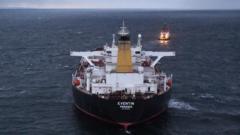German maritime authorities successfully rescued the Eventin oil tanker, reportedly part of Russia's "shadow fleet," after it lost power in the Baltic Sea. This incident raises concerns regarding the use of unsanctioned vessels in the ongoing geopolitical tensions following Russia's invasion of Ukraine.
Germany Rescues Russian Oil Tanker Stuck in Baltic Sea Amid Shadow Fleet Allegations

Germany Rescues Russian Oil Tanker Stuck in Baltic Sea Amid Shadow Fleet Allegations
The Eventin tanker, linked to Russia's sanctioned oil industry, is rescued by Germany amid accusations from Berlin that Moscow is using a fleet to evade sanctions.
Germany’s maritime authorities have confirmed that the oil tanker stranded in its waters is associated with Russia's "shadow fleet," a term used to describe vessels that circumvent sanctioned trade routes. The vessel, named Eventin and flying a Panamanian flag, suffered a power and steering failure, prompting authorities to deploy tugboats to secure the vessel and prevent any potential ecological disasters.
German Foreign Minister Annalena Baerbock placed responsibility on the Kremlin, accusing President Vladimir Putin of undermining European security and sanctions through the use of obsolete tankers. “They are ruthlessly deploying a fleet of rusty tankers,” said Baerbock, drawing attention to how Russia allegedly attempts to get around penalties imposed by Western nations since the invasion of Ukraine in 2022.
As the Eventin, measuring 274 meters long and 48 meters wide and laden with approximately 99,000 tonnes of oil, drifted with a low speed in the rough Baltic waters near Rügen Island, German maritime authorities executed a well-coordinated rescue operation. A team was deployed by helicopter to establish towing connections, ultimately involving three tugboats working to stabilize the vessel. The authorities reported that no oil leaks were detected during the incident.
The ongoing situation showcases the complexities of enforcing sanctions in maritime contexts against Russia's oil sector. Officials from the US, UK, and EU have previously imposed strict measures in an effort to constrain Russia's ability to export oil and, in turn, fund its military ventures. Reports indicate that Russia employs the "dark fleet" strategy, utilizing older tankers with often obscured ownership details, navigating outside of typical maritime regulations.
In December, the EU made comments targeting Russia's shadow fleet, indicating forthcoming sanctions in the wake of disrupted undersea cables linked to Russian vessels in the Baltic region. As part of coordinated Western efforts against Russia’s oil industry, both the UK and US recently intensified their sanction regimes, according to which Russian companies like Gazprom Neft claimed the measures were "illegitimate."
The Eventin incident spotlights the ongoing geopolitical tensions and the extent to which Russia continues to maneuver around international sanctions while reinforcing the need for vigilance and accountability in maritime operations.



















